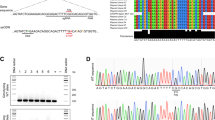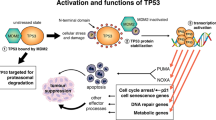Abstract
The p53 protein integrates multiple upstream signals and functions as a tumor suppressor by activating distinct downstream genes1,2,3. At the cellular level, p53 induces apoptosis, cell cycle arrest and senescence. A rare mutant form of p53 with the amino acid substitution R175P, found in human tumors, is completely defective in initiating apoptosis but still induces cell cycle arrest4,5. To decipher the functional importance of these pathways in spontaneous tumorigenesis, we used homologous recombination to generate mice with mutant p53-R172P (the mouse equivalent of R175P in humans). Mice inheriting two copies of this mutation (Trp53515C/515C) escape the early onset of thymic lymphomas that characterize Trp53-null mice. At 7 months of age, 90% of Trp53-null mice had died, but 85% of Trp53515C/515C mice were alive and tumor-free, indicating that p53-dependent apoptosis was not required for suppression of early onset of spontaneous tumors. The lymphomas and sarcomas that eventually developed in Trp53515C/515C mice retained a diploid chromosome number, in sharp contrast to aneuploidy observed in tumors and cells from Trp53-null mice. The ability of mutant p53-R172P to induce a partial cell cycle arrest and retain chromosome stability are crucial for suppression of early onset tumorigenesis.
This is a preview of subscription content, access via your institution
Access options
Subscribe to this journal
Receive 12 print issues and online access
$259.00 per year
only $21.58 per issue
Buy this article
- Purchase on SpringerLink
- Instant access to the full article PDF.
USD 39.95
Prices may be subject to local taxes which are calculated during checkout





Similar content being viewed by others
References
Ko, L.J. & Prives, C. p53: puzzle and paradigm. Genes Dev. 10, 1054–1072 (1996).
Levine, A.J. p53, the cellular gatekeeper for growth and division. Cell 88, 323–331 (1997).
Vogelstein, B., Lane, D. & Levine, A.J. Surfing the p53 network. Nature 408, 307–310 (2000).
Rowan, S. et al. Specific loss of apoptotic but not cell-cycle arrest function in a human tumor derived p53 mutant. EMBO J. 15, 827–838 (1996).
Ludwig, R.L., Bates, S. & Vousden, K.H. Differential activation of target cellular promoters by p53 mutants with impaired apoptotic function. Mol. Cell. Biol. 16, 4952–4960 (1996).
Deng, C., Zhang, P., Harper, J.W., Elledge, S.J. & Leder, P. Mice lacking p21CIP1/WAF1 undergo normal development, but are defective in G1 checkpoint control. Cell 82, 675–684 (1995).
el-Deiry, W.S. et al. WAF1, a potential mediator of p53 tumor suppression. Cell 75, 817–825 (1993).
Lowe, S.W., Jacks, T., Housman, D.E. & Ruley, H.E. Abrogation of oncogene-associated apoptosis allows transformation of p53-deficient cells. Proc. Natl. Acad. Sci. USA 91, 2026–2030 (1994).
Soengas, M.S. et al. Apaf-1 and caspase-9 in p53-dependent apoptosis and tumor inhibition. Science 284, 156–159 (1999).
Lowe, S.W., Schmitt, E.M., Smith, S.W., Osborne, B.A. & Jacks, T. p53 is required for radiation-induced apoptosis in mouse thymocytes. Nature 362, 847–849 (1993).
Clarke, A.R. et al. Thymocyte apoptosis induced by p53-dependent and independent pathways [see comments]. Nature 362, 849–852 (1993).
Lee, Y., Chong, M.J. & McKinnon, P.J. Ataxia telangiectasia mutated-dependent apoptosis after genotoxic stress in the developing nervous system is determined by cellular differentiation status. J. Neurosci. 21, 6687–6693 (2001).
Donehower, L.A. et al. Mice deficient for p53 are developmentally normal but susceptible to spontaneous tumours. Nature 356, 215–221 (1992).
Jacks, T. et al. Tumor spectrum analysis in p53-mutant mice. Curr. Biol. 4, 1–7 (1994).
Nacht, M. & Jacks, T. V(D)J recombination is not required for the development of lymphoma in Trp53-deficient mice. Cell Growth Differ. 9, 131–138 (1998).
Harvey, M. et al. In vitro growth characteristics of embryo fibroblasts isolated from p53-deficient mice. Oncogene 8, 2457–2467 (1993).
Venkatachalam, S. et al. Retention of wild-type Trp53 in tumors from p53 heterozygous mice: reduction of p53 dosage can promote cancer formation. EMBO J. 17, 4657–4667 (1998).
Liao, M.J. et al. No requirement for V(D)J recombination in p53-deficient thymic lymphoma. Mol. Cell. Biol. 18, 3495–3501 (1998).
Hundley, J.E. et al. Increased tumor proliferation and genomic instability without decreased apoptosis in MMTV-ras mice deficient in p53. Mol. Cell. Biol. 17, 723–731 (1997).
Tarapore, P. & Fukasawa, K. Loss of p53 and centrosome hyperamplification. Oncogene 21, 6234–6240 (2002).
Tlsty, T.D. Regulation of genomic instability in preneoplastic cells. Cancer Surv. 28, 217–224 (1996).
Donehower, L.A. Genetic instability in animal tumorigenesis models. Cancer Surv. 29, 329–352 (1997).
Lengauer, C., Kinzler, K.W. & Vogelstein, B. Genetic instability in colorectal cancers. Nature 386, 623–627 (1997).
Tarapore, P., Horn, H.F., Tokuyama, Y. & Fukasawa, K. Direct regulation of the centrosome duplication cycle by the p53-p21Waf1/Cip1 pathway. Oncogene 20, 3173–3184 (2001).
Schmitt, C.A. et al. Dissecting p53 tumor suppressor functions in vivo. Cancer Cell 1, 289–298 (2002).
Symonds, H. et al. p53-dependent apoptosis suppresses tumor growth and progression in vivo. Cell 78, 703–711 (1994).
Kinzler, K.W. & Vogelstein, B. Cancer-susceptibility genes. Gatekeepers and caretakers. Nature 386, 761–763 (1997).
Liu, G. et al. High metastatic potential in mice inheriting a targeted p53 missense mutation. Proc. Natl. Acad. Sci. USA 97, 4174–4179 (2000).
Lakso, M. et al. Targeted oncogene activation by site-specific recombination in transgenic mice. Proc. Natl. Acad. Sci. USA 89, 6232–6236 (1992).
Kapoor, M. & Lozano, G. Functional activation of p53 via phosphorylation following DNA damage by UV but not gamma radiation. Proc. Natl. Acad. Sci. USA 95, 2834–2837 (1998).
Acknowledgements
We thank S. Lowe and P. Nolan for reagents and K. Ramirez for assistance with FACS analysis. This work was supported by grants from the US National Cancer Institute and The Kadoorie Charitable Foundation.
Author information
Authors and Affiliations
Corresponding author
Ethics declarations
Competing interests
The authors declare no competing financial interests.
Rights and permissions
About this article
Cite this article
Liu, G., Parant, J., Lang, G. et al. Chromosome stability, in the absence of apoptosis, is critical for suppression of tumorigenesis in Trp53 mutant mice. Nat Genet 36, 63–68 (2004). https://doi.org/10.1038/ng1282
Received:
Accepted:
Published:
Issue date:
DOI: https://doi.org/10.1038/ng1282
This article is cited by
-
Permission to pass: on the role of p53 as a gatekeeper for aneuploidy
Chromosome Research (2023)
-
Partial p53 reactivation is sufficient to induce cancer regression
Journal of Experimental & Clinical Cancer Research (2022)
-
Of the many cellular responses activated by TP53, which ones are critical for tumour suppression?
Cell Death & Differentiation (2022)
-
p53 partial loss-of-function mutations sensitize to chemotherapy
Oncogene (2022)
-
The telomere complex and the origin of the cancer stem cell
Biomarker Research (2021)



